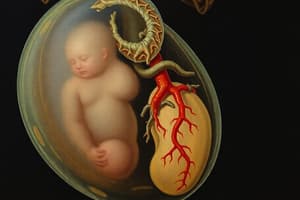Podcast
Questions and Answers
Organogenesis refers to the process of organ development in embryos during _____ life
Organogenesis refers to the process of organ development in embryos during _____ life
fetal
Organogenesis occurs between the _____ and eighth weeks of human pregnancy
Organogenesis occurs between the _____ and eighth weeks of human pregnancy
third
The pre-embryonic stage is characterized by cell division and initial _____
The pre-embryonic stage is characterized by cell division and initial _____
differentiation
The zygote forms through the union of a male (_____) and female (egg) gamete
The zygote forms through the union of a male (_____) and female (egg) gamete
The embryonic period lasts from week _____ to eight
The embryonic period lasts from week _____ to eight
During organogenesis, cells undergo profound changes in shape, movement, and _____
During organogenesis, cells undergo profound changes in shape, movement, and _____
Organogenesis begins with ______, a critical event that occurs around week three.
Organogenesis begins with ______, a critical event that occurs around week three.
Gastrulation involves the invagination of ______ cells, the outer layer of the embryo, into the middle layer of mesoderm.
Gastrulation involves the invagination of ______ cells, the outer layer of the embryo, into the middle layer of mesoderm.
The primitive streak emerges at what will become the ______ end of the embryo, initiating the process of secondary axis formation.
The primitive streak emerges at what will become the ______ end of the embryo, initiating the process of secondary axis formation.
Heart development begins in week ______ with the formation of a beating heart.
Heart development begins in week ______ with the formation of a beating heart.
By week ______, the buccopharyngeal membrane resorbs, closing the cranial end of the digestive tube.
By week ______, the buccopharyngeal membrane resorbs, closing the cranial end of the digestive tube.
Genitalia begins to form by week ______.
Genitalia begins to form by week ______.
Flashcards are hidden until you start studying
Study Notes
Fetal Development: Organogenesis
Introduction
Organogenesis refers to the process of organ development in embryos during fetal life. It is the period between the third and eighth weeks of human pregnancy when the body's organs and systems begin to form. This phase follows the pre-embryonic stage and precedes the fetal period, which focuses on the growth and maturation of existing tissues and structures. Understanding organogenesis is crucial for understanding human development from a biological perspective.
Pre-embryonic Stage
The first two weeks of pregnancy mark the pre-embryonic stage, characterized by cell division and initial differentiation. The zygote forms through the union of a male (sperm) and female (egg) gamete, leading to the formation of an early embryo. This stage also involves a rapid increase in cell numbers through mitosis, leading to a multi-cellular cluster called a morula by the fourth day of pregnancy.
Embryonic Period: Organogenesis
The embryonic period, lasting from week three to eight, involves organ development. During this phase, cells undergo profound changes in shape, movement, and differentiation. Four processes are essential for shaping the developing fetus: cell proliferation, cell specialization, cell interaction, and cell movement. These processes enable the approximately 20,000–25,000 genes in the human genome to give rise to as many as 100,000 different proteins, providing the conceptus with form and substance.
Organogenesis begins with gastrulation, a critical event that occurs around week three. Gastrulation involves the invagination of epiblast cells, the outer layer of the embryo, into the middle layer of mesoderm, replacing the hypoblast. Concurrently, the primitive streak emerges at what will become the posterior end of the embryo, initiating the process of secondary axis formation.
Throughout this period, various organs begin their formation. For example, the digestive tube starts differentiating in week three, with the elongation and folding of the endoderm sheet forming a closed tube. By week four, the buccopharyngeal membrane resorbs, closing the cranial end of the digestive tube. In parallel, heart development begins in week four with the formation of a beating heart, detectable by ultrasound by week six.
In week seven, the limb buds start developing, while midgut herniates throughout the umbilical ring, forming almost entirely outside the peritoneal cavity. By week ten, genitalia begins to form.
Fetal Period: Maturation and Growth
The fetal period, which follows organogenesis, is characterized by tissue maturation and rapid growth of the body. This stage extends from about week eight until birth, although some progressive changes continue until age 25 years.
During the fetal period, various activities contribute to the maturation of the organs formed during organogenesis. Additionally, the fetus experiences rapid growth due to increasing tissue mass and nutrient intake.
Teratogens and Organogenesis
Avoiding exposure to teratogens, substances known to cause birth defects, is essential during the organogenesis period. Prenatal damage can lead to abnormalities in the developing embryo or fetus, affecting the function and structure of organs.
Studying That Suits You
Use AI to generate personalized quizzes and flashcards to suit your learning preferences.




